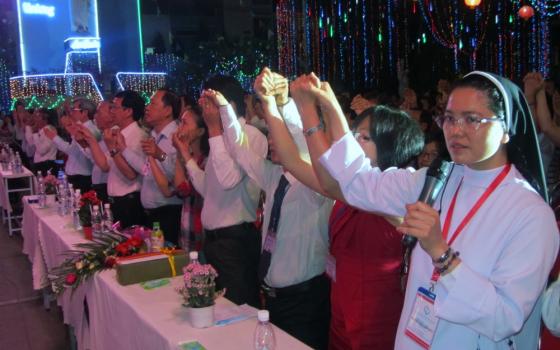Sr. Mary Nguyen Thi Hong Que, a member of Tam Hiep Dominican Sisters based in Bien Hoa City, southern Vietnam, heads the education program (www.chuongtrinhchuyende.net) of the Ho Chi Minh City archdiocese’s Family Ministry Committee.
Sr. Que obtained an M.A. in psychology of counseling at De La Salle University in 2007 and finished courses on leadership and spiritual direction at East Asian Pastoral Institute the following year, in the Philippines. She is a marriage guidance counselor, busy giving talks on leadership and life-coping skills to Catholic youths, women, lay leaders, priests and women religious throughout the country.
Would you talk about your education program?
With volunteers I hold Saturday workshops on family values, the challenges of marriage, family-building skills, communication skills, the Billings ovulation method, ways of reading, smartphone abuse and other issues relating to health, ethics, environment and society. Those workshops draw audiences of 50 to 300 people. We also send reports on workshops to over 20,000 people via email.
At the pastoral center and parishes, we conduct celebrations marking Mother’s Day, Father’s Day, Valentine Day, Vietnamese Family Day and so on. Speakers include priests, religious women, laity and people from other faiths.
We also work with private training and consulting organizations to conduct inexpensive courses in living skills. We ask our partners to reduce their course costs, so that poor people can afford attending them. We cover part of the fees, too, so people only pay 500,000 dong (U.S. $23.80) for courses that usually cost about 2.5 million to 5 million dong. In addition, we hold Masses, prayers, sharing of God’s word and spiritual direction through such courses. We make it easy for people to come to learn the Bible or prayers.
We also publish books, CDs and DVDs focusing on Catholic topics and family values. Our products are sold at low prices or without charge at Catholic bookstores and the pastoral center.
What do you love to do most?
I like to give lectures on leadership, living skills, psychological problems and marriage to parish council members, young people at parishes, and priests at dioceses that invite me.
I am naturally keen to conduct such courses, and I feel very healthy and cheerful while I am lecturing.
My first priority is to conduct courses at dioceses and parishes in remote areas where people live in poverty and have difficulty in traveling.
You are a nun without direct personal experience in marriage. How did you get involved in family ministry?
Lots of people ask me this question. In 2000 I started working as a counselor for a love, marriage and family counseling unit (under the auspices of the social work center run by the government), where I heard numerous stories about the sufferings of families, so I became involved in this ministry. I also provided marriage guidance to Catholic women at parishes and listened to their sad stories and problems.
Before I started to conduct courses on families at parishes, I asked parish priests (who contacted me) to tell me about the common problems facing parishioners, and then we focused on particular challenges. I also listened to local people’s stories and gave them advice about how to deal with their problems.
Of course, I use my knowledge and people’s real stories to ease the sufferings of families – to bring people to God, who heals and saves them. And I see my work benefiting people.
However, it has taken me a long time to be recognized in a society where women’s role is not welcomed. At first many diocesan priests would go to my lectures reluctantly – and they asked their organizers, ‘Why don’t you invite a bishop or priest to present lectures to us, instead of a nun?’
I told them, ‘Please come to my lectures and then you’ll find the answers.’ After courses, people often invite me to come back again for more.
I think I am called to do family ministry; I try to complete my work successfully and quietly. I never raise funds for my programs; people who are interested in the programs make voluntary donations. And I always work under the authority of the priest who heads the Family Ministry Committee.
Is there any similarity between married people and religious ones?
Couples have to remain faithful entirely to their spouses, while we religious women take vows of chastity – but first and foremost, both need to make sacrifices in order to keep their vows.
People are not able to overcome difficulties and challenges unless they lead a life of prayer; God protects them. Most broken homes lack prayer and spiritual life.
[Joachim Pham is a correspondent for Global Sisters Report based in Vietnam.]


